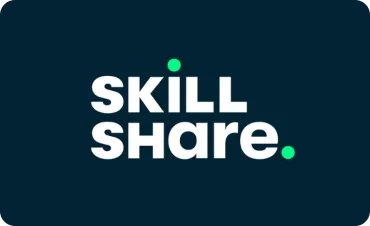When you enroll through our links, we may earn a small commission—at no extra cost to you. This helps keep our platform free and inspires us to add more value.

Learn Animation Production with Blender 2. 9
Unlock creativity with Skillshare! Learn acrylic painting, AI writing, graphic design, and photography. Explore thousands of engaging courses and develop new skills at�your�own�pace!

This Course Includes
 skillshare
skillshare 0 (0 reviews )
0 (0 reviews ) 10 hours 52 minutes
10 hours 52 minutes  english
english Online - Self Paced
Online - Self Paced course
course SkillShare
SkillShare
About Learn Animation Production with Blender 2. 9
Promo Video-Learn Animation Production with Blender 2.9
001 A Brief Introduction to Blender
002 Reference Images and Project Scale
003 Beginning the Cargo Container
004 Blocking In the Front of the Ship
005 Blocking In the Engines
006 Creating the Rear Thruster
007 Adding Detail to the Cargo Container
008 Modeling the Side Clamps
009 Creating a Top Hinge Clamp
010 Using the Boolean Modifier
011 Modeling the Landing Gear
012 Adding Detail to the Rear Engine
013 Adding Panels to the Ship
014 Modeling the Window Frame Details
015 The Discombobulator Add on and the Array Modifier
016 Adding Details to the Front of the Ship
017 Adding Details to the Back of the Ship
018 Finishing the Back of the Ship
019 Naming Objects and Organizing the Outliner
020 Beginning the Landing Bay
021 Modeling Sci Fi Panels in the Landing Bay
022 Using the Path Tool to Create Hoses
023 Finishing the Modeling and Organizing the Scene
024 Creating Sci Fi Panels with the Node Editor
025 Adding Grunge to the Panels
026 Adding Sci Fi Panels to Front and Side
027 Texturing the Rear Engine and Window Frame
028 Materials for the Front Panels
029 Finishing the Materials for the Ship
030 Setting Up the Materials for the Container
031 Painting Edge Wear on the Container
032 Adding Materials to the Landing Bay
033 Finishing the Materials of the Landing Bay
034 Beginning the Star Field edit
035 Finishing the Star Field
036 Beginning the Planet
037 Adding Color to the Planet
038 Adding the Roughness and Bump Information
039 Creating Cloud Layers
040 Adding Lights to the Landing Bay
041 Adding a Sun Light for the Planet
042 Beginning the Landing Gear Rig
043 Setting Up Inverse Kinematics
044 Continuing the Landing Gear Rig
045 Finishing the Rig for the Ship
046 Starting on the Animation
047 Continuing the Ship Animation
048 Using the Graph Editor
049 Animating the Landing Gear
050 Finishing the Ship Animation
051 Animating a Texture for the Plasma Drive
052 Creating the Rocket Exhaust
053 Animating the Rocket Exhaust
054 Final Adjustments
055 Creating a Test Render
056 Importing Characters Into the Scene
057 Rendering the Final Animation
058 Adding Music in the Video Sequencer
059 Adding the Fly In Sound Effects
060 Editing the Landing Sound Effects
061 Rendering the Animation with Audio
062 Conclusion
What You Will Learn?
- In this course we will create an animated scene solely in Blender, from the first polygon to the final render. We will begin by bringing in and setting-up reference images that will help us create the 3D models of the ship, the cargo container, and the landing bay. We will then use Blender’s Node Editor to create the materials and textures for the 3D objects. Once that is complete we will begin work on creating the star fields, as well as the planet and cloud layers..
- To prepare the ship for animation, you will learn how to create the rig for the landing gear, so that we can animate the legs and control the ship's bounce when it lands. You will also learn how to use Blender’s Graph Editor as we animate the ship coming in for a landing. And we will have some fun animating a texture to create the plasma-drive engines, and create a jet exhaust animation for the rear of the ship..
- You’ll learn how to import characters into the scene and how to render a final animation. We will then bring in music and sound effects and mix the audio to picture in Blender’s Video Sequence Editor. Lastly, we will render out a video clip with both picture and sound..
- If you’ve ever wanted to create your own animated scenes in Blender, then this course is for you. Using only free, open-source software you can create anything you can imagine..
- So join me for this complete course where you'll Learn Animation Production with Blender 2.9..